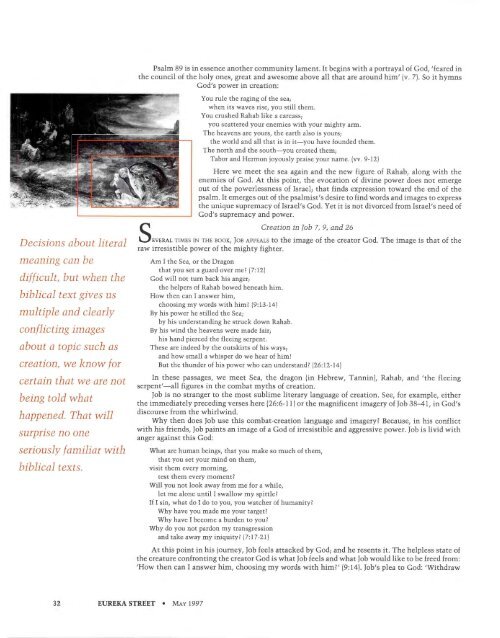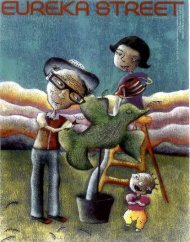Psalm 89 is in essence another community lament. It begins with a portrayal of God, 'feared inthe council of the holy ones, great and awesome above all that are around him' (v. 7). So it hymnsGod's power in creation:Decisions about literalmeaning can bedifficult, but when thebiblical text gives usmultiple and clearlyconflicting imagesabout a topic such ascreation, we know forcertain that we are notbeing told whathappened. That willsurpnse no oneseriously familiar withbiblical texts.SYou rule the raging of the sea;when its waves rise, you still them.You crushed Rahab like a carcass;you scattered your enemies with your mighty arm.The heavens are yours, the earth also is yours;the world and all that is in it- you have founded them.The north and the south- you created them;Tabor and Hermon joyously praise your name. (vv. 9-12)Here we meet the sea again and the new figure of Rahab, along with theenemies of God. At this point, the evocation of divine power does not emergeout of the powerlessness of Israel; that finds expression toward the end of thepsalm. It emerges out of the psalmist's desire to find words and images to expressthe unique supremacy of Israel's God. Yet it is not divorced from Israel's need ofGod's supremacy and power.Creation in fob 7, 9, and 26EVERAL TIMES IN THE BOOK, JoB APPEALS to the image of the creator God. The image is that of theraw irresistible power of the mighty fighter.Am I the Sea, or the Dragonthat you set a guard over me? ( 7: 12)God will not turn back his anger;the helpers of Rahab bowed beneath him.How then can I answer him,choosing my words with him? (9: 13-14)By his power he stilled the Sea;by his understanding he struck down Rahab.By his wind the heavens were made fair;his hand pierced the fleeing serpent.These are indeed by the outskirts of his ways;and how small a whisper do we hear of him!But the thunder of his power who can understand? (26 :1 2-14)In these passages, we meet Sea, the dragon (in Hebrew, Tannin), Rahab, and 'the fleeingserpent'-all figures in the combat myths of creation.Job is no stranger to the most sublime literary language of creation. See, for example, eith erthe immediately preceding verses here (26:6-11) or the magnificent imagery of Job 38-41, in God'sdiscourse from the whirlwind.Why then does Job use this combat-creation language and imageryz Because, in his conflictwith his friends, Job paints an image of a God of irresistible and aggressive power. Job is livid withanger against this God:What are human beings, that you make so much of them,that you set your mind on them,visit them every morning,test them every moment?Will you not look away from me for a while,let me alone until I swallow my spittle?If I sin, what do I do to you, you watcher of humanity?Why have you made me your target?Why have I become a burden to you?Why do you not pardon my transgressionand take away my iniquity? (7: 17-2 1)At this point in his journey, Job feels attacked by God; and he resents it. The helpless state ofthe creature confronting the creator God is what Job feels and what Job would like to be freed from:'How then can I answer him, choosing my words with him?' (9:14) . Job's plea to God: 'Withdraw32 EUREKA STREET • M AY 1997
your hand far from me, and do not let dread of you terrify m e' ( 13:21 ).The book of Job draws on the language of creation by combat and the image of God as mightyfighter in order to convey Job's frustration at his inability to meet God on even terms, as one princeto another (cf. 3 1:3 7).Creation in Isaiah 27 and 51ISAlAH 51 REFLECTS THE AGONY OF EXILES who long tO return home. The agony finds words in poetrythat is both plea and promise.Awake, awake, put on strength,0 arm of the LoRD!Awake, as in days of old,the generations of long ago!Was it not you who cut Rahab in pi eces,who pierced the drago n?Was it not you who dried up the sea,the waters of the great deep;who made the depths of the sea a wayfo r the redeem ed to cross over?So the ransomed of the LORD shall return,and come to Zion with singing .. . . (5 1:9-11)Here again, we m eet Rahab, the dragon (Tannin), and the sea (and the deep that was covered bydarkness in Gen 1 :2). Almost like a modern film-maker, Isaiah blends the image of the sea, driedup in creation, into the image of the sea divided at the exodus. So creation blends into salvation.The pow er of the God who subdued Rahab and the dragon is the power at God's disposal for thesalvation and return of those in exile-the return to Zion with singing.Isaiah draws on this imagery of awesome power because of the exiles' n eed to have faith in aGod who has the capacity to bring them home.Elsewhere in the book of Isaiah, the prophecy points to a future time when God will restoreorder to creation. The passage, Isaiah 24:20-27:1 , begins by pointing to the future wh en God 'willpunish the h ost of heaven' (24:20) and 'the moon will be abash ed, and the sun ashamed' (24:23).The passage ends with imagery that is by now familiar:O n that day the LORD with his cruel and great and strong sword will punish Leviathan the fleei ngserpent, Leviathan the twi sting serpent, and he will kill the dragon that is in the sea. (27: 1)Before w e m oderns are too easily dismissive of primitive m ythology, we need to be aware thatthese combat images occur in some of the m ost sophistica ted literature of our Bible: Isa iah, Job,and Psalms. The power of God is celebrated as creator, magnificently superior to the forces ofchaos: the dragon, the serpent, the sea; Leviathan, Rahab, Tannin- the en emies of God. This iscreation faith used for maximum theological effect.ACreation in Genesis 2CTUALLY, THE TEXT WE ARE LOOKING AT is Gen 2:4b-25. 'Genesis 2' is a comfortable shorthand;and 'Gen esis 1' will be a similar shorthand for Gen 1: l-2:4a. Genesis 2 is the text of the co-operativeartist, we might almost say 'artisan '. The God of Genesis 2 is a working God:Then the LORD God formed man from the dust of the ground ... . (2:7)Similarly, in pursuit of a partner for the man:Out of the ground the LORD God formed every animal of the fieldand every bird of the air, and brought them to the man to sec whathe would call them; and whatever the man called every living creature,that was its nam e. (2: 19)'Every animal' and 'every bird' would have used up a lot of 'ground' and surelyleft a weary God. Yet it i the God of Genesis 1 who will rest on the seventh dayfrom all the work that he had done-who hardly 'w orked' at all (cf. Gen 2:2).A lot of people forget the major differences between this account of creationand the account in Genesis 1. In Genesis 1, of course, everything is created,including the earth and its vegetation, birds and beasts, man and woman. Yet inJob is no stranger tothe most sublimeliterary language ofcreation. See, forexample, either theimmediately precedingverses here (26:6-11) orthe magnificentimagery of Job 38-41,in God's discoursefrom the whirlwind.Why then does Job usethis combat-creationlanguage and imagery~Because, in his conflictwith his friends, Jobpaints an ilnage of aGod of irresistible andaggressive power. Job islivid with angeragainst this God ...VOLUME 7 N UMBER 4 • EUREKA STREET 33
















